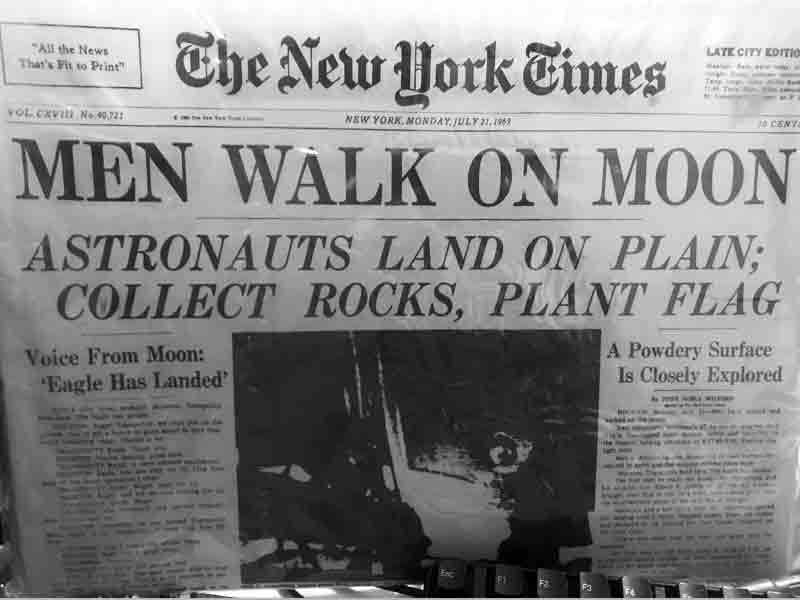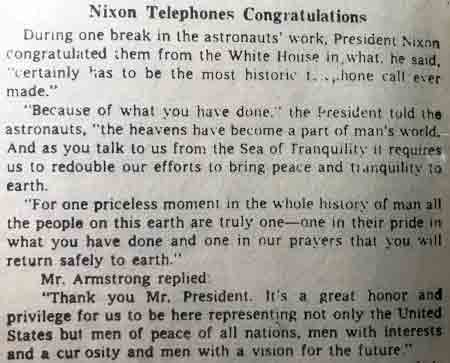Opinion: Apollo 11 anniversary remind us vision, passion makes the difficult possible

By JIM BROOKS
Nelson County Gazette
Thursday, July 20, 2023 — I doubt there are many people who think much about today being anything other than just another day in July. But for me its the anniversary of a day in history that represents a turning point in U.S. and world history.
It was on this day in 1969 that NASA Astronauts Neil Armstrong and Edwin “Buzz” Aldrin were the first men to set foot on the moon.
I was a 9-year-old kid living in Bardstown’s Maple Hill neighborhood with three older siblings and my parents in what today’s Realtors might call a “900-square-foot mid-century bungalow.”
My neighborhood was the result of the post-World War II building boom, and it was a microcosm of post-war America: Most families were headed by ex-GI’s and their wives, raising their families and working hard to capture a slice of the American Dream.
In the late 1960s, I was — like my brother — obsessed with everything science fiction and the real world of the NASA space program. Back in those days, my parents’ house received two daily newspapers every day: the Courier-Journal in the morning, and the Louisville Times in the evening. We poured through the “A” section of both newspapers each day, searching for science and space-related news and updates on the ongoing NASA projects.

In his famous September 1962 address at Rice University, President John F. Kennedy vowed that the United States would send a man to the moon and back by the end of the decade. I grew up in the shadow of watching NASA evolve its technology, beginning with the Mercury program, moving on to Gemini, and then the Apollo moon program. By the late 1960s, the space agency and thousands of its contractors were working feverishly to achieve Kennedy’s goal.
My older brother Bennie and I followed the TV news of each Apollo flight, from December 1968’s Apollo 8 moon fly-around to the mid-July 1969 launch of Apollo 11, which would bring us the first attempted moon landing.
TV channels — the three over-the-air channels we could receive out of Louisville — carried national programming with hour-by-hour progress of the Apollo missions. We also listened nightly to WHAS 840 radio for related news.
Millions watched Apollo 11 launch on the morning of July 16, 1960; millions more worldwide watched on TV or listened to radio broadcasts the day of the moon landing — Sunday, July 20, 2023 — as the lunar module carrying two astronauts descended, touching down on the moon at 4:17 p.m. Eastern time.
The real excitement came several hours later, when, at 10:51 p.m., Armstrong descended from the lunar lander and became the first man to step on the moon.
My oldest brother David that summer was a cast member of “The Stephen Foster Story.” With such a huge event taking place the same night as a performance of “the drama,” David arrived home particularly early that night in time to watch the moon walk. He explained that with such a historic event taking place, the cast agreed to run through that night’s performance in a faster-than-normal pace. Everyone was able to catch the moon landing as it happened live.
While that Sunday night in July was more than five decades ago, for me, I still feel the same marvel and excitement, watching with my brother as Armstrong took his first steps. At times, it feels like it happened last Sunday night. I’ve never lost the excitement and wonder of what an accomplishment it was for all humanity.
My fascination with the space program led me to focus on science and technology in school and high school and an electronics engineering degree after high school.
I think the real lesson I learned from those days years ago is that we — collectively as a nation as well as individuals — can accomplish great things if we have the energy, passion, vision and motivation to pursue them.
After hearing my many recollections of my youth following the space program, my son, who is head-and-shoulders more technically talented than me, was impressed by the quality of the engineering NASA was able to accomplish using — by today’s standards — such rudimentary devices like math calculations on paper and slide rules. It’s ironic to realize we have more computer power in our smartphones than NASA had to guide their spacecraft to the moon and back.
My hope is that our current generation of kids who are the age I was in 1969 can look at today’s technological challenges, find the motivation to envision solutions and the passion to follow through.
In the end, I can’t help but believe JFK said it best in his 1963 address at Rice University:
“We choose to go to the moon. We choose to go to the moon in this decade and do the other things, not because they are easy, but because they are hard, because that goal will serve to organize and measure the best of our energies and skills, because that challenge is one that we are willing to accept, one we are unwilling to postpone, and one which we intend to win.”
President John F. Kennedy, September 1962 address at Rice University
-30-





